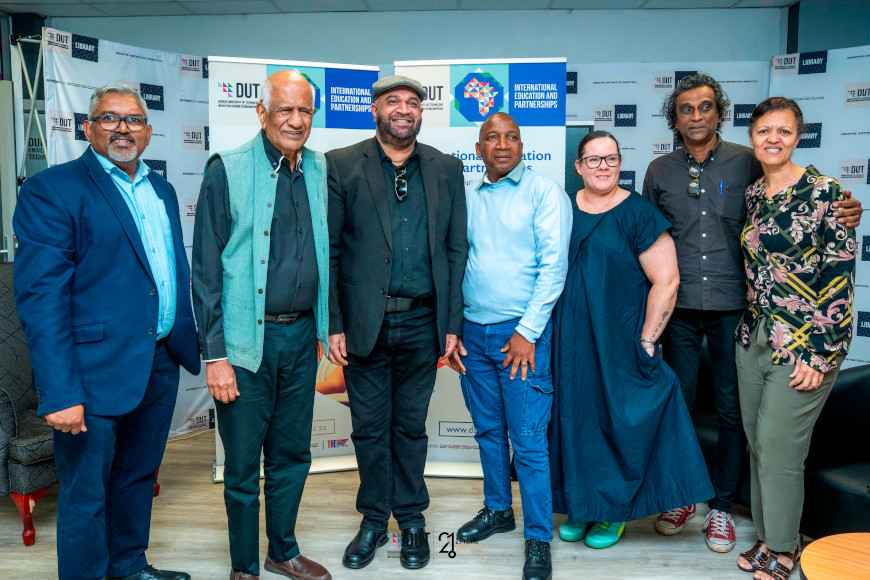The Durban University of Technology’s (DUT) International Education and Partnerships Directorate, in collaboration with the Library Directorate, successfully hosted a hybrid panel discussion titled “South African Sport and Nation Building in a Post-Apartheid Era” on Thursday, 6 November 2025. The stimulating discussion took place at the BM Patel Library Conference Centre on the ML Sultan Campus and was attended by both physical and online participants, reflecting DUT’s commitment to creating inclusive platforms for critical dialogue and knowledge sharing.
Dr Lavern Samuels, Director of International Education and Partnerships, warmly welcomed the panellists and participants, setting the tone for what became an insightful afternoon of reflection and debate. Dr Samuels noted that sport holds a special place in the hearts of South Africans, often shaping the collective mood of the nation. “We have seen what sport can do for a country. The mood of the nation shifts when we lose, and it is lifted when we win. Our World Cup victories have done amazing things for South Africa,” he said, drawing attention to the unifying moment when President Nelson Mandela lifted the Rugby World Cup in 1995 a symbol of hope and reconciliation.
Dr Samuels also reminded the audience that transformation remains a defining challenge and opportunity in post-apartheid South Africa. “It touches the very roots of nation building and social cohesion and remains a challenge we need to engage with courageously,” he said. His remarks echoed the event’s purpose to reflect on transformation not as a single event or policy, but as a continuous and multifaceted process that requires open dialogue, inclusivity, and collective commitment.
The panel discussion was chaired by Honourable Justice Zak Yacoob, a retired judge of the Constitutional Court and respected advocate for human rights and social justice. Justice Yacoob’s experience in law, activism, and social reform added depth and credibility to the day’s discussions, as he skilfully guided a diverse panel of experts through complex reflections on sport, transformation, and identity.
The esteemed panel featured Dr Chantell Gouws, Head of the Sport Studies Department at DUT; Mr Bongani Yengwa, Head of DUT Sport Administration and an SABC Sport analyst; Mr Niren Tolsi, an award-winning journalist and researcher; Dr Cecil Tafireyi, a researcher and consultant in Physical Education and Health Promotion; Dr Gregory Houston, Research Fellow at the University of the Free State; and Mr Robin Peterson, head coach of the Warriors cricket team and former Proteas player. Each panellist brought a unique perspective to the conversation, enriching the discussion with their personal experiences, professional expertise, and historical insights.
Throughout the session, speakers explored the intricate relationship between sport, politics, and society in South Africa. They examined how sport served as both a site of division under apartheid and a tool of unity and reconciliation in the democratic era. Several panellists reflected on how moments of sporting triumph such as South Africa’s World Cup victories in rugby and cricket have become national milestones that temporarily bridge social divides and foster pride.
One of the most thought-provoking contributions came from Krish Govender, a veteran sports activist and former member of the South African Council on Sport (SACOS). Speaking passionately, he recounted his experiences in the 1970s and 1980s, highlighting that SACOS was more than a sporting body it was a political movement deeply rooted in the struggle for liberation. “SACOS was about liberation. Sport was part of a broader political struggle for equality and justice,” he explained. He credited teachers and schools during that era for promoting both academic and physical development, arguing that sport should once again be integrated into education as a vital part of personal growth.
Govender further emphasised that genuine transformation in sport cannot be achieved without revitalising school-level participation. “You need a radical change of thinking in the country. Sport must be built into the education system from 8 a.m. to 4 p.m. if we want to develop the next generation of athletes,” he said. His remarks highlighted a recurring theme in the discussion the urgent need for structural reform in grassroots sports and education systems to ensure inclusivity and sustainability.
Panel members also discussed how transformation in sport reflects broader societal challenges, including inequality, access to resources, and representation. They agreed that while significant progress has been made, persistent disparities remain, especially in historically marginalised communities. The conversation underscored that transformation must extend beyond symbolic gestures to create equitable systems that nurture talent across all social and racial groups.
Carol Newman International Education Officer delivered the vote of thanks. She expressed heartfelt appreciation to Justice Yacoob, the panellists, organisers, and all participants who joined both in person and online. “It has been such a rich and enlightening discussion, filled with diverse viewpoints and reflections that could easily continue for hours. Thank you for your commitment and passion,” she said.
Gifts of appreciation were then presented to the panellists as a token of gratitude for their valuable contributions.
Pictured: The Director of International Education and Partnerships at DUT, Dr Lavern Samuels with the distinguished panellists at the event.
Pictured S’bonelo Dlamini
Sinamile Sithole

